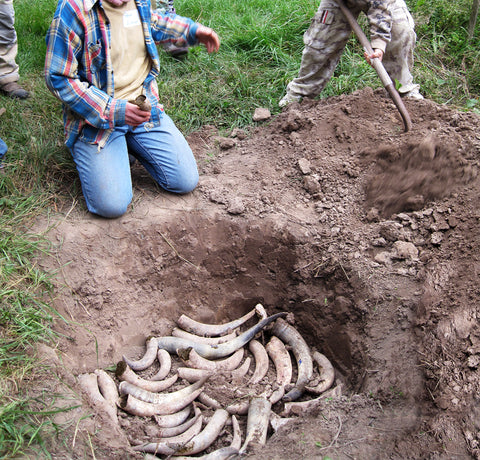As we celebrate Earth Day we wanted to highlight the fascinating world of biodynamics, a revolutionary approach to agriculture pioneered by Rudolf Steiner (1861-1925), whose visionary insights still resonate today.
In the bucolic setting of Koberwitz, a village then in Germany, now in Poland, Steiner delivered his seminal "Agriculture Course" in June 1924, responding to the clamor of farmers hungry for alternative methods. These lectures, transcribed in the book "Agriculture," laid the cornerstone of biodynamic agriculture.
Steiner's prescient warnings about the perils of chemical fertilizers foreshadowed today's concerns about soil, plant, and animal health. He introduced the concept of the farm as a self-sustaining organism, advocating biodiversity, crop-livestock integration, and closed-loop fertility systems.
Biodynamic farming transcends organic standards, embodying a holistic ecological ethos. It shuns synthetic chemicals, prioritizing the health of both humans and the environment.
The hallmark of biodynamic farming lies in its four foundational principles:
-
Closed Loop System: Livestock, especially cows, play a vital role, with their manure enriching the soil through preparations like horn manure (500). Even wineries with limited space explore innovative solutions for integrating animals into their operations.
-
Biodiversity: Biodynamic farms teem with diverse crops, from fruit trees to olive groves, fostering resilience and ecosystem health. Water conservation is paramount, with certified properties dedicating land for conservation.
-
Use of Biodynamic Preparations: Steeped in tradition yet scientifically rigorous, biodynamic preparations like horn manure (500) and silica spray (501) nurture plant vitality and resilience, echoing ancient agricultural wisdom.
-
Holistic and Interconnected: Biodynamic farms are microcosms of biodiversity, each with its unique "taste of place." This interconnectedness underscores the farm's identity as a living, breathing organism.
Maria Thun's pioneering work with lunar cycles further enriched biodynamic practices, revealing how the moon's rhythms influence plant growth and vitality. Her Biodynamic Sowing and Planting Calendar, based on lunar phases, has become a staple for farmers worldwide.
The lunar cycle's dance orchestrates the flow of water within plants, guiding optimal times for planting, watering, harvesting, and rest. Root days signify planting and pruning, while leaf days invite nurturing and watering. Fruit days herald the peak of harvest, while flower days encourage leaving the vineyard undisturbed, honoring nature's rhythms.
In the realm of biodynamics, every action harmonizes with nature's symphony, yielding not just sustenance, but a profound connection to the land and its rhythms.
The impact of biodynamic practices on wines is a subject of ongoing debate within the wine community. While there is anecdotal evidence and support from many biodynamic winemakers who attest to the positive effects of these practices on wine quality, scientific studies validating these claims remain limited and inconclusive.
While many biodynamic winemakers ( including some of the world’s best Estates) believe in the positive impact of these practices on wine quality, conclusive scientific evidence to support these claims remains elusive. The influence of biodynamics on wines continues to be a subject of interest and debate among researchers, wine enthusiasts, and industry professionals alike.
But for the winemakers who are practicing and living daily in their Biodynamic vineyards and wineries. Here are some of the reason they believe in biodynamic.
- Enhanced Flavor Profile: Biodynamic farming prioritizes soil health, biodiversity, and natural vineyard management. As a result, grapes grown in biodynamic vineyards often exhibit more intense flavors, reflecting the unique characteristics of the land.
- Balanced Ecosystem: By treating the vineyard as a holistic ecosystem, biodynamic practices promote a balanced interplay between soil, plants, and animals. This equilibrium fosters healthier vines and grapes, translating into wines with greater complexity and depth.
- Minimal Intervention: Biodynamic winemaking minimizes the use of synthetic chemicals and additives, allowing the true expression of the grape and terroir to shine through. This hands-off approach preserves the purity and integrity of the wine, resulting in a more authentic tasting experience.
- Lunar Influence: Biodynamic winemakers follow lunar cycles for planting, pruning, and harvesting, aligning vineyard activities with natural rhythms. This lunar guidance is believed to enhance grape quality and flavor, contributing to the overall character of the wine.
- Unique Preparations: Biodynamic preparations, such as horn manure (500) and silica spray (501), are applied to the vineyard to enhance soil fertility and plant health. These natural remedies contribute to the vine's resilience and vitality, influencing the quality of the grapes and, consequently, the wine.
- Distinctive Terroir: Biodynamic farming celebrates the notion of terroir—the unique combination of soil, climate, and geography that imparts character to wine. By nurturing the vineyard's terroir through sustainable practices, biodynamic winemakers craft wines that reflect their specific sense of place, offering consumers a true taste of the land.
In summary, biodynamic practices enrich the world of wine by fostering healthier vineyards, enhancing grape quality, and preserving the integrity of the terroir. The result is a portfolio of wines that captivate the senses, telling a story of land, tradition, and sustainability.


